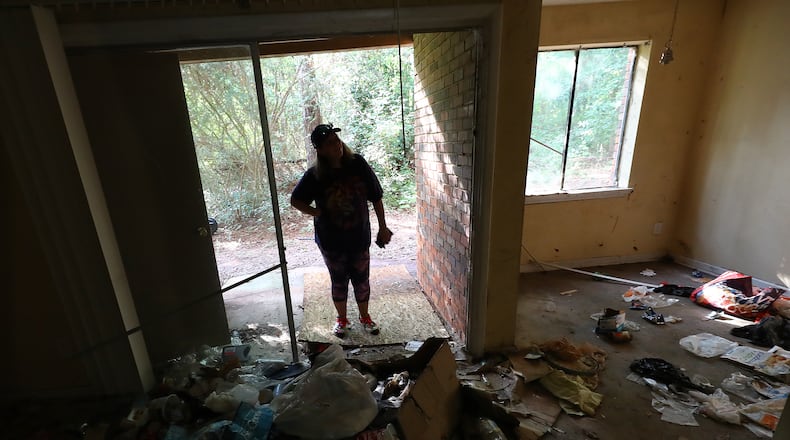A bill introduced Tuesday and backed by top Republicans would bolster renters’ right to livable housing conditions, filling holes in state law that advocates have said put Georgia behind most of the nation.
The Safe at Home Act would require landlords to provide rental homes that are “fit for human habitation” and increase protections for tenants who are facing eviction because they failed to pay their rent on time. Current state law does not specify what conditions make a home habitable, and tenants must continue to pay rent even if their rental is unsafe to live in.
House Speaker Jon Burns credited The Atlanta Journal-Constitution’s Dangerous Dwellings series for prompting the proposal, House Bill 404. The 18-month investigation found that Georgia’s lack of tenant protections and basic condition standards allow dangerous apartment complexes to flourish in metro Atlanta.
Out-of-town investors have been flocking to the area, buying dilapidated apartments, raising rents, flipping them for millions in gains, and leaving residents to live amidst mold, sewage backups, gunfire, chronic apartment fires or other hazards. Combined, these complexes account for at least 281 homicides and 20,000 serious crimes in Clayton, Cobb, DeKalb, Fulton and Gwinnett counties over five years, the examination showed.
Credit: Curtis Compton / AJC
Credit: Curtis Compton / AJC
Burns said unsafe rental housing is a statewide problem.
“There needs to be some common-sense regulations put in place that allows everyone in the state to be safe at home,” he said.
The bill tries to strike a balance, according to Safe at Home Act sponsor Rep. Kasey Carpenter.
Creating too many new requirements would push the state’s rising rents even further out of reach for many Georgians, Carpenter said. The Dalton Republican said he moved 16 times before the age of 18 in homes across Whitfield County, an experience that made him want to improve conditions for families living in rentals.
“You start layering in a bunch of regulation and then rent rates will not decrease,” Carpenter said.
Under the bill, landlords would have to give tenants who are late on rent three days to make payment before an eviction is filed in court. Landlords would also be barred from turning off cooling to delinquent tenants before eviction proceedings are complete. Security deposits would be capped at three times the amount of monthly rent.
The bill would also give landlords the power to expedite eviction for tenants charged or convicted of certain serious crimes, or who have committed a crime that threatens the health and safety of others on the property. The AJC found hundreds of apartment complexes are plagued by violent crime, and tenants said that some landlords turn a blind eye to gang members and drug dealers. However, the investigation found that frequently the crimes are committed by those who don’t live at the complex.
House Majority Leader Chuck Efstration, R-Dacula, backs the bill, as does State Rep. Sharon Cooper, chairman of the Public Health committee. The Marietta Republican successfully pushed in 2019 for the first legislation to increase tenant protections in decades.
Efforts to strengthen tenant protections have previously faced long odds at the General Assembly, even though such measures have shown wide public support. A January poll by the Journal-Constitution found an overwhelming majority of respondents — 90% — said Georgia should create laws that set minimum living requirements for rental properties.
The new bill is a chance to see real improvement for families living in unsafe conditions, said Elizabeth Appley, a lobbyist and 30-year advocate for safe, healthy and affordable housing. It may open the door to allow tenants to withhold rent or terminate their lease if their apartment is uninhabitable, she said. These protections are commonplace in other states.
“We’re going to work to make sure that it is fleshed out in a way that protects the health and safety of Georgia families,” Appley said.
Our Reporting
The Atlanta Journal-Constitution’s Dangerous Dwellings investigation in 2022 revealed that weak tenant protection laws have made Georgia a magnet for private equity and other absentee investors. They have bought up aging apartment buildings, hiked rents and fees and skimped on upkeep and security, trapping tens of thousands of metro Atlantans in apartment complexes with rampant crime and squalor. Read the investigation and see the list of more than 270 persistently dangerous complexes online at www.ajc.com/dwellings
Key provisions of HB404
1. Landlords would be required to provide rentals that are “fit for human habitation.” Georgia is among three states that don’t have specific requirements for livability of rental properties and among eight that don’t allow tenants to withhold rent, no matter how bad the living conditions. The Journal-Constitution investigation found complexes throughout the metro area that were barely habitable.
2. Tenants would have a guaranteed three-day grace period after missing a rent payment before an eviction proceeding can be filed. The AJC found that Georgia is among five states that don’t provide a grace period for late rent.
3. Landlords would be banned from cutting off air-conditioning prior to completion of an eviction action. State law currently makes it unlawful for a landlord to cut off heat, light or water.
4. Security deposits would be capped at no more than three times the monthly rent. Georgia is among two dozen states that lack a cap on security deposits. Tenants say the stiff deposits, along with ever-increasing fees, make it impossible for them to move from dangerous apartments.
5. The eviction process would be expedited for tenants who have recently been charged or convicted with certain crimes, including a violent felony or sexual offense, or has committed a crime threatening the health, safety or welfare of others.
About the Author
Keep Reading
The Latest
Featured





